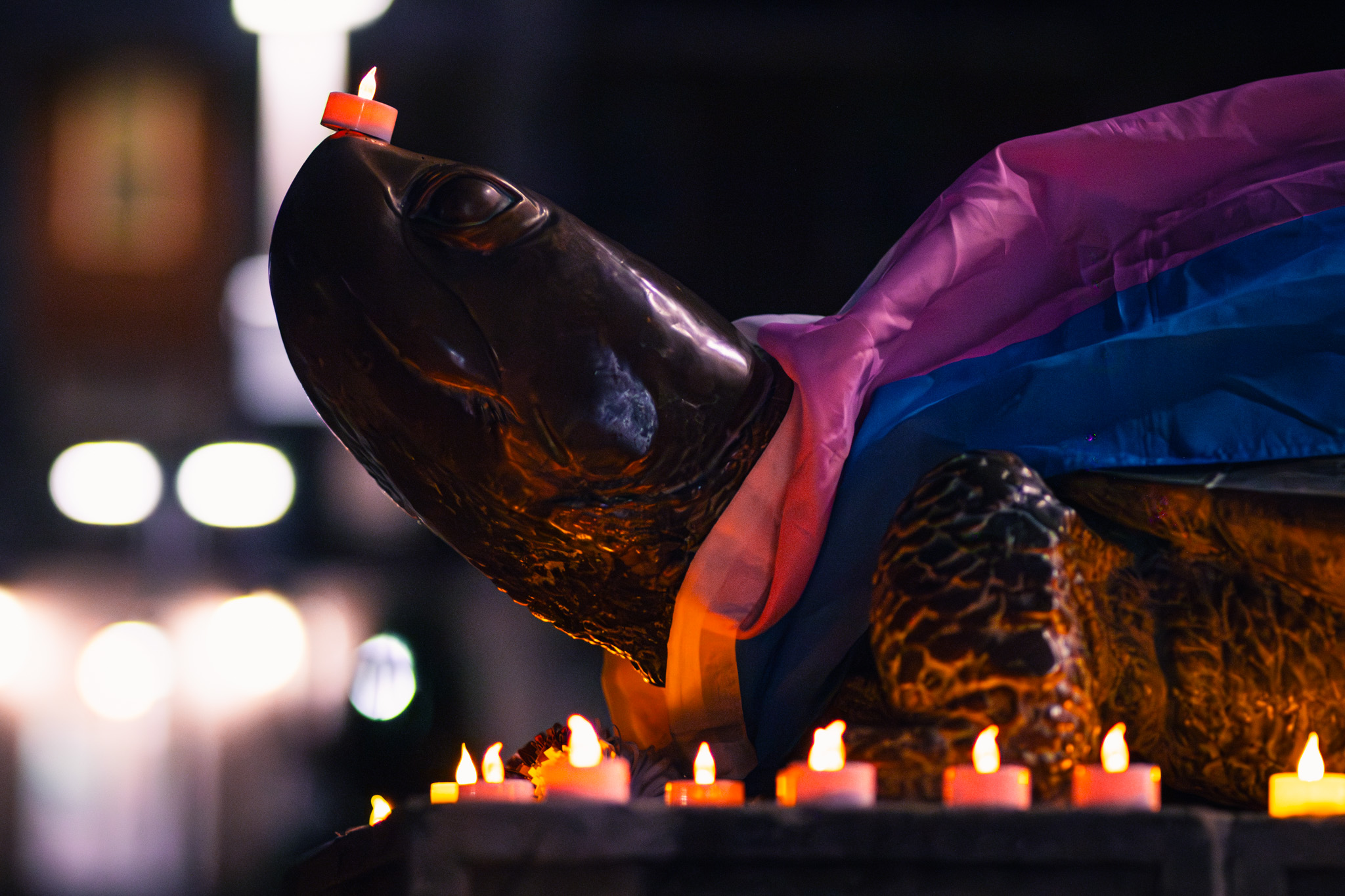By Lillian Glaros and Audrey Keefe
Dozens of University of Maryland community members gathered Friday in front of McKeldin Library to mourn Nex Benedict, a nonbinary and indigenous high school student in Oklahoma who died last month.
Vigil attendees draped a transgender flag over the Testudo statue near McKeldin Library and surrounded the statue with photos, candles and signs. The event included a moment of silence for Benedict and several speeches, where students called attention to transphobia in schools.
Benedict, a 16-year-old student, was involved in a physical altercation with three girls in an Owasso High School restroom on Feb. 7, according to the Associated Press. Benedict died the next day, according to the Owasso Police Department. The department said the investigation into Benedict’s death is ongoing.
Benedict was bullied at school due to their gender identity, their mother told The Independent last month. Several LGBTQ+ rights groups have emphasized that strict anti-trans laws in Oklahoma have allowed for an increase in violence and hateful rhetoric directed at trans youth, the Associated Press reported.
Celeste Good, who organized this university’s vigil, reflected on how Benedict’s death has impacted LGBTQ+ communities during a speech they gave.
“It can’t be overemphasized that Nex was a kid and they had their whole life in front of them,” the higher education, student affairs and international education policy master’s student said. “All queer folks are at risk and it is imperative that we stand up for and protect each other.”
Like Good, Max Tubalov, a sophomore criminology and criminal justice and women, gender and sexuality studies major, voiced frustration with the increase in violence and discrimination targeting trans communities.
“I am tired and I am really angry and I don’t know what to do,” Tubalov said in a speech at the vigil.
Benedict’s death has sparked a national conversation about state legislation that prohibits gender-affirming care or otherwise targets trans community members.
In 2022, Oklahoma lawmakers passed a law that requires all public school students to use the restroom that corresponds to the sex listed on their birth certificate. Another law passed in the state in 2022 banned nonbinary markers on birth certificates.
Multiple vigil attendees expressed feelings of exhaustion related to the fear they have of discrimination and violence. Students also emphasized that trans students need stronger protections in schools.
The increase in anti-trans legislation around the U.S. has made it “hard to live,” Good told The Diamondback. NPR reported last year that at least 12 states passed bans or limits on gender-affirming health care for young people in 2023, joining multiple others.
Alex Robey, a freshman physiology and neurobiology major, said the rise in such legislation makes it unnecessarily complicated for trans students. The laws make “existence so terrifying” for trans people, they noted.
“I think legislation just puts up so many blockades on people trying to exist,” Robey said.
When others perpetuate hate towards trans communities, there needs to be accountability when those communities are grieving and healing, Robey added.
Lindsey Walter, a freshman microbiology major, said people must educate themselves and others about trans issues to mitigate transphobia and violence. Hate often stems from ignorance, Walter said.
Walter said that while the support system at the vigil was comforting, they often feel powerless in preventing transphobia.
“It really hit me pretty hard because I’m one person. I don’t have that much power in this world,” Walter said.
This university offers support to students in the LGBTQ+ Equity Center in Marie Mount Hall and counseling services for LGBTQ+ community members on Tuesdays through Fridays from 3-4 p.m. in the Shoemaker Building. Bias Incident Support Services also offers resources to students who have experienced hate bias on campus.
Moving forward, Walter emphasized that LGBTQ+ community members will remain resilient despite the recent rise in violence.
“We’re gonna be here regardless of what you do or say,” Walter said. “Learn to accept us.”



